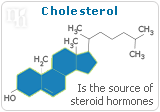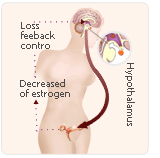
Until recently it was widely thought that the depletion of eggs in the ovaries and the following change in estrogen levels in a women's body was the sole cause for menopause as a woman reached the end of her reproductive life. However recent research may be about to change the way medical professionals see menopause. It comes in the form of a report by the Study of Women's Health Across the Nation (SWAN) who have embarked upon research to determine the real reasons for lowering estrogen levels in older women and if such wavering estrogen levels are caused by aging of the nervous system as well.
Researchers studied 3302 women from across the United States of America and from varying ethnic backgrounds. Of this group of women 680 completed this particular study to determine the true cause of menopause symptoms. All were considered to be of an older reproductive age. The women were asked to provide daily urine samples, fill out a questionnaire and diary recording their experiences of early menopause symptoms such as hot flashes, night sweats and sleep disturbances.

The results are interesting as these women can effectively be split into 3 groups. The first group recorded estrogen increases during their menstrual cycles which lead to LH surges, a normal occurrence in a healthy woman of young reproductive age. The second group had strong estrogen surges but no corresponding LH surge and the third neither estrogen nor LH in high volume. The third group recorded the largest amount of menopause symptoms. Researchers noted that the second group indicated that there was a failure of estrogen positive feedback on LH secretion. This should normally be regulated by the nervous system.
Although these results are not conclusive they do show that aging of the nervous system could be a factor in the onset of menopause symptoms. The third group for instance did not show any surges in estrogen or LH when compared to those of a healthy young women. This may demonstrate that these women have more age related damage to their nervous systems than others in the study.
There were marked differences in the estrogen levels of the women in this study and that demonstrates that there may be more factors involved with the onset of menopause than previously thought. If wavering estrogen levels are connected to the way in which the nervous system ages, then it is likely that new treatments for estrogen based menopause symptoms can be developed. It is clear from this study that more research needs to be carried out into the ways to establish whether a woman's estrogen levels are changing due to depletion of eggs in the ovaries or aging of the nervous system in order to make treating women easier in the future.